
Context
Malnutrition in all its forms, including undernutrition as well as overweight and obesity, is the biggest global burden of disease.
According to recent estimates, one third of the people on the planet are malnourished, with 2 billion people overweight or obese and 821 Mio people going hungry. Children under five years of age face multiple burdens: 149 million are stunted, 49.5 million are wasted and 40 million are overweight (SOFI 2019).
Stunted children are too short for their age and have irreparable limitations on their development, including their brain if no optimal nutrition is provided during the first 1000 days. Thus, they carry a lifelong burden of irreversible, negative preconditions for a prosperous life. It is vital to break the vicious circle of malnutrition, which is passed from malnourished mothers to their babies and to invest in the prevention of malnutrition (WHO). Economists estimate a 1:16 cost-benefit ratio of lost contributions from stunted individuals to societal development.
SDC's approach
SDC works on nutrition with a multi-sectorial and rights-based approach drawing on humanitarian and development instruments and lobbying for a change in food systems to make them more sustainable, nutrition-enhancing and healthy. SDC performs both, nutrition specific interventions, which supply the individual with the necessary macro- and micronutrients to avoid deficiencies or treat severe malnutrition as well as nutrition sensitive interventions which address the underlying causes of malnutrition, such as access to sufficient, diverse and affordable food, to clean water and sanitation, to health care services as well as empowerment of women as key actors for assuring divers and nutritious diets.
Key resources
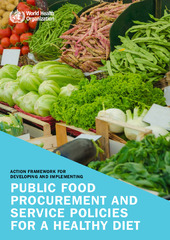 Action framework for developing and implementing public food procurement and service policies for a healthy diet
Action framework for developing and implementing public food procurement and service policies for a healthy diet
WHO technical document, January 2021
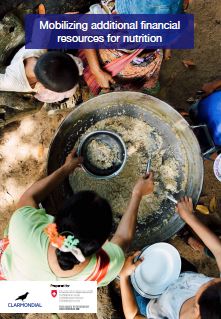 Mobilizing additional financial resources for nutrition
Mobilizing additional financial resources for nutrition
Prepared for SDC by Clarmondial AG, November 2020
Authors: Tanja Havemann and Christian Speckhardt
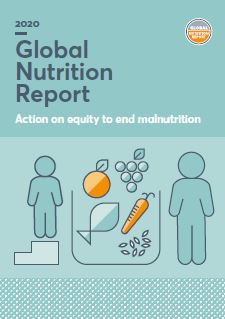 2020 Global Nutrition Report: Action on equity to end malnutrition
2020 Global Nutrition Report: Action on equity to end malnutrition
Development Initiatives, 2020
Executive Summary in
English |
French |
Spanish
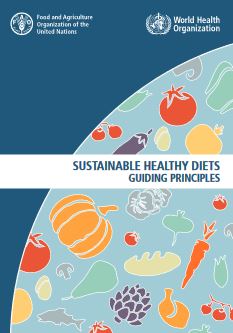 Sustainable Healthy Diets - Guiding Principles PDF, 6576 KB
Sustainable Healthy Diets - Guiding Principles PDF, 6576 KB
FAO and WHO 2019
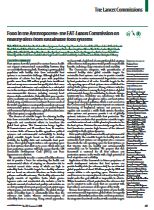 Food in the Anthropocene: the EAT–Lancet Commission on healthy diets from sustainable food systems PDF, 1298 KB
Food in the Anthropocene: the EAT–Lancet Commission on healthy diets from sustainable food systems PDF, 1298 KB
Walter Willett et al., www.thelancet.com, January 2019
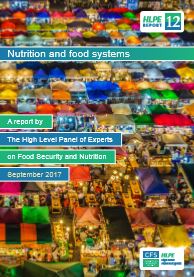 Nutrition and food systems PDF, 5738 KB
Nutrition and food systems PDF, 5738 KB
A report by the High Level Panel of Experts on Food Security and Nutrition,
September 2017
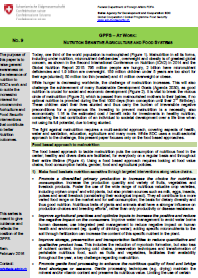 Nutrition Sensitive Agriculture and Food Systems PDF, 654 KB
Nutrition Sensitive Agriculture and Food Systems PDF, 654 KB
GPFS – At Work, No. 9
SDC Global Programme Food Security, February 2016
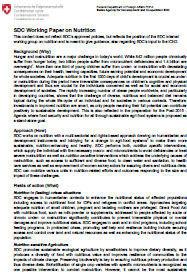 SDC Working Paper on Nutrition PDF, 232 KB
SDC Working Paper on Nutrition PDF, 232 KB
Swiss Agency for Development and Cooperation
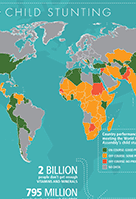 Nutrition Graphs
Nutrition Graphs
Collection of interesting graphs related to nutrition
complied by the SDC Working Group Nutrition
Further resources (chronological list)
Projects
Global / Multi-country
Sustainable Nutrition for all (Zambia, Uganda; Phase 2)
Small holder farmers are supported to diversify their food production and consumption.
Overview of context and aim
Info by SNV
Project videos by SNV:
- Overview
-
Zambia
-
Uganda
Nutrition in Mountain Agro-Ecosystems NMA (Global; Phase 2)
A disproportionally high number of the world's 2 billion hungriest and chronically malnourished people reside in mountain regions. As a mountain country, Switzerland supports the Mountain Agro ecology Action Network to make Rural Service Providers in 8 mountain countries competent regarding nutrition. They shall adapt their services to actively contribute for improving nutrition for half a million people, particularly women and children.
Overview of context and aim
Info by IFOAM
Strengthening the Right to Adequate Food, FIAN International (Global; Phase 2)
With 815 million undernourished people in 2017, the right to food as laid in the 1948 Universal Declaration of Human Rights is still not realized. For the past thirty years, FIAN International has raised awareness about people's right to food worldwide and expanded spaces for civil society to hold governments more accountable. This project will promote effective participation of rights holders in food security and nutrition policies and governance mechanisms and be complemented by SDC support to the mandate of the UN Special rapporteur on the right to food.
Overview of context and aim
GAIN Global Alliance for Improved Nutrition – “Making markets work to improve the consumption of nutritious and healthy food" (Global, Phase 1)
Poor diets - too little food, too much food, or the wrong combinations of foods - are the number-one risk factor for ill health. What people eat depends on what is available on the market as well as accessible, affordable and desirable to consume. SDC supports the Global Alliance for Improved Nutrition, a Swiss-based foundation, in facilitating the voluntary engagement of businesses in low and middle income countries to improve the consumption of nutritious and healthy foods, particularly among the vulnerable and poor.
Overview of context and aim
Global Measurement of Diet Quality (Global; Phase 1)
Diets are the number one risk factor in the global burden of disease and multiple forms of malnutrition co-exist with overweight and obesity being the fastest growing form, particularly among poor populations in developing countries. Routinely collected information on Diet Quality is necessary to better understand dietary trends, help to create awareness, and inform policies to improve diets and health outcomes. Therefore, SDC supports an international initiative to develop diet quality measurements.
Overview of context and aim
Scaling up Nutrition Pooled Fund (SUN – Pooled Fund) (Global; Phase 2)
Sound nutrition relevant policies and strategies are a prerequisite to eliminate hunger and malnutrition. The Scaling Up Nutrition (SUN) Movement brings together governments, civil society, donors, UN agencies, researchers and private sector actors to collaborate in support of countries to combat malnutrition. SDC participates in the SUN Pooled-Fund, which strengthens civil society engagement and multi-stakeholder platforms in the fight against malnutrition in the SUN countries.
Overview of context and aim
Global RECAP – Promoting healthy diet and physical activity (Global, Phase 1)
Switzerland plays a critical role in moving the agenda for non-communicable diseases (NCDs) at national and international level forward. NCDs constitute a major global health challenges today with critical economic consequences. Unhealthy diet and physical inactivity are the main causes of obesity and NCDs. Switzerland aims at strengthening individual and institutional capacity and enabling environments for legal and regulatory measures to promote healthy diet and physical activity.
Overview of context and aim
Sub-Saharan Africa
Food security in the Great Lakes Region – Nutrition (Rwanda, Burundi, DRC; Phase 2)
Multidisciplinary partnerships and multi-stakeholder alliances wrought by One UN agencies and the Governments of Burundi, Rwanda and DRC develop practical solutions to deliver activities in support of the institutionalization of nutrition strategies in the respective countries. The activities take place at the provincial level, in locations where food insecurity and poverty are at highest level; they feed-back to the respective coordination secretariat, thus ensuring an appropriate political steering of the strategies.
Overview of context and aim
Assistance nutritionnelle aux orphelins et autres vulnérables (Burundi, single phase)
L'assistance nutritionnelle de ce projet est offerte aux orphelins et autres personnes vulnérables de 11 organisations caritatives locales à travers Caritas Burundi. La sécurité alimentaire est assurée par des projets agroalimentaires dans le cadre d'un nexus humanitaire-développement qui permet à la Suisse de contribuer durablement à la réduction de la faim et de se conformer à la Convention sur l'assistance alimentaire dans un pays aux taux de malnutrition et de pauvreté des plus élevés.
Sustainable water and pasture management to alleviate the plight of Ethiopian pastoralists (Ethiopia; Phase 1)
Drought, fodder scarcity and conflicts over natural resources make life difficult for pastoralists in southern Ethiopia. The SDC has taken various measures to improve their food security and their resilience to crisis situations, ranging from the rehabilitation of pastureland and water points to the introduction of land use plans and the diversification of income sources for women.
Overview of context and aim
Seeds and Knowledge Initiative (SKI), Phase 2
In view of increasing smallholder farmers' resilience in food security in Southern Africa, the Seed Knowledge Initiative strengthens farmer-led seed systems and agroecological practices, and empowers farmers' organisations and civil society rnovernents to advocate for agroecology and farmers' rights. Decision and policy-makers at the national level will be engaged to support smallholder farmers' access to diverse and locally adapted seed and agroecological practices.
Contribution to the Pan African Bean Research Alliance PABRA (Regional; Phase 13)
The greatest global challenge today is how to ensure food and nutrition security of a rapidly growing human population, considering climate change and without adversely affecting the natural base upon which the production is dependent. Beans, as the most important consumed grain legume, are a very good source of vitamins, minerals, and plant derived micronutrients. Significant yield increase of more than 60% are possible, following access to and use of improved varieties coupled with integrated crop management practices.
Overview of context and aim
Soutien aux Dispositifs Nationaux de Prévention et de Gestion des Crises Alimentaires au Burkina Faso, au Mali et au Niger
Au Niger, Mali et Burkina Faso des millions de personnes sont affectées chaque année par l'insécurité alimentaire et nutritionnelle qui se détériore principalement en raison de l'insécurité civile croissante. Ces crises entrainent les ménages dans un cercle vicieux de pauvreté et de vulnérabilité. Pour faire face à ce défi, les autorités des trois pays ont créé un dispositif national de prévention et de gestion des catastrophes et crises alimentaires. La Suisse accompagne ces Dispositifs afin de soutenir durablement la sécurité alimentaire des populations les plus vulnérables.
Niger
Mali
Opérationnalisation de la filière semencière au Tchad (phase 2)
Au Tchad, le système de production agricole est rudimentaire et les rendements sont faibles. Le pays est régulièrement confronté à l'insécurité alimentaire. La semence est le principal intrant utilisé par les agriculteurs. C'est pourquoi, la DDC contribue à faciliter l'accès à des semences de qualité et adaptées à leur environnement. Ce programme permet aux exploitations familiales d'améliorer leur sécurité alimentaire et nutritionnelle, leur production et leur revenu et développe l'auto-emploi des femmes et des jeunes grâce à la multiplication de semences.
Overview of the context and aim
Asia
Home Garden (Nepal, Phase 4)
Small and marginal farmers in Nepal, especially women and children, are regularly exposed to malnutrition and are vulnerable to external shocks such as health risks and natural hazards. Home garden aims to improve family nutrition and reduce vulnerability of such individuals and households. Objectives are to diversify dietary sources of disadvantaged groups in homestead for family consumption and increase capacity for adaptation to natural hazards and climate change. The project strengthens the safety net and the coping strategy of the most vulnerable in Nepal.
Overview of context and aim
Enhancing Nutrition of Upland Farming Families ENUFF (Laos, Phase 2)
In Lao PDR, chronic malnutrition is a pressing issue affecting social and economic growth. Stunting prevalence is amongst the highest in the world, affecting an estimated 44% of children under five years of age, and exceeding 60% among children from upland ethnic communities. The ENUFF project contributes to the implementation of the national Multisectoral Food and Nutrition Security Action Plan (MSFNSAP), where various aspects like nutrition-sensitive farming, health, hygiene and care practices will be converged, leading to behaviour changes and an improved nutritional status in particular of women and children.
Overview of context and aim
Cambodian Horticulture Project Advancing Income and Nutrition (CHAIN)
The Cambodian Horticulture Advancing Income and Nutrition (CHAIN) programme is implemented by SNV and aims to develop and strengthen horticulture value chains in close collaboration with public and private sector actors in four least-developed provinces in the northeast of Cambodia. The SDC mandated programme supports poor, smallholder women and men farmers to increase their productivity and income and to improve food security, nutrition and climate resilience.
Overview of context and aim
Community
SDC works on nutrition with a multi-sectorial and rights-based approach drawing on humanitarian and development instruments.
The working group on nutrition is consequently composed of representatives from different departments. It aims to raise awareness for the multi-sectorial challenge of malnutrition within SDC and support the operations in making country strategies, programs and projects more nutrition sensitive. It facilitates experience exchange and learning within SDC and its networks.
The group contains representatives from the following departments (logged in members can view the minutes of group meetings and the list of representatives):
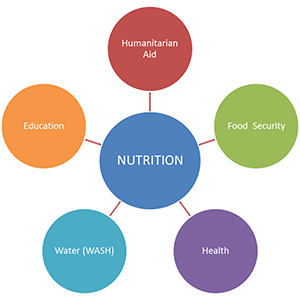
Asia
Eastern Europe and Central Asia
West Africa
Eastern and Southern Africa
Global Institutions (UNICEF)
Global Programme Food Security
Global Programme Health
Global Programme Water
Multilateral Humanitarian Aid
Africa Humanitarian Aid
Network Agriculture and Food Security
Network Education
For the position of the Working Group see:
SDC Working Paper on Nutrition
Contact:
gpfs@eda.admin.ch
list of current representatives (access for logged in members only)
